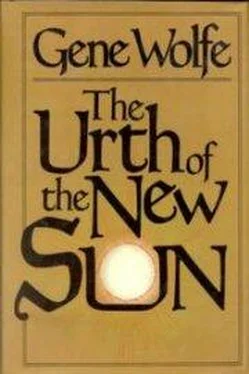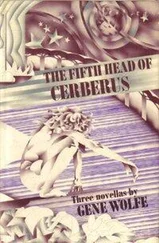Chapter XXXIII — Aboard the Alcyone
SHE WAS a xebec, low in the water and narrow at the waist. Her foremast carried an immense lateen sail, her pole mainmast three square sails that could be dropped to the main deck for reefing, and her mizzen a gaffsail, with a square topsail above it. Her gaffsail boom was lengthened by a flagstaff, so that on festive occasions (and such it appeared Hadelin considered our departure to be) an overwrought banner could be hung over the water. Flags of like design, representing no nation on Urth so far as I knew, flapped from the tops.
In truth, there is something irresistibly festive about a sailing, provided it takes place in daylight and good weather. At every moment it seemed to me that we were about to depart, and at every moment my heart grew lighter. I felt it was wrong to be happy, that I should be miserable and exhausted, as indeed I had been when I looked down at poor Zama’s body and for some time after. Yet I could not continue so. I pulled up the hood of my cloak as I had once drawn up the hood of my guild cloak when I strode smiling down the Water Way to exile, and although this cloak (which I had taken from my stateroom on Tzadkiel’s ship upon a morning that now seemed as remote as the first dawn of Urth) was fuligin purely by chance, I smiled once more at the realization that the Water Way stretched along this very river and the water lapping our sides must soon wash its dark curbs.
Afraid Burgundofara might return or that some sailor would glimpse my face, I climbed the few steps to the quarterdeck and discovered we had put out while I sat alone with my thoughts. Os was already far behind us, and would have been out of sight had not the atmosphere been as clear as hyalite. Its wretched lanes and vicious people I knew well enough; but the sparkling morning air made its staggering wall and tumbledown towers seem those of just such an enchanted town as I had seen in Thecla’s brown book. I remembered the story, of course, as I remember everything; and I began to tell it to myself, leaning over the railing and whispering the words as I watched the fading town, lulled by the easy rocking of our vessel, which heeled scarcely at all under the slightest of breezes.
THE TALE OF THE TOWN THAT FORGOT FAUNA
Long ago, when the plow was new, nine men journeyed up a river in search of a site upon which to establish a new city . After many a day of weary rowing through mere wilderness, they came upon a place where an old woman had built a hut of sticks and planted a garden.
There they beached their boat, for the supplies they had carried with them were gone, and for many days they had eaten only such fish as they could catch in the river and drunk only river water. The old woman, whose name was Fauna, gave them mead and ripe melons, beans white, black, and red; carrots and turnips; cucumbers as thick as your arm; and apples, cherries, and apricots.
That night they slept before her fire; and in the morning, as they walked over the land eating its grapes and strawberries, they saw that everything needed to build a great city was there, where stone could be floated down from the mountains upon rafts of logs, where there was good water in abundance and the rich soil engendered a green birth from every seed.
Then they held a council. Some urged that they should kill the old woman. Others, more merciful, that they should only drive her away. Still others proposed that they should trick her by this means or that.
But their leader was a pious man who said, “If we do any of these evil things, you may be sure the Increate will not permit it to pass without notice, for she has welcomed us and given us of all she possesses except her land. Let us offer our money for that. It may be she will accept it, not knowing the value of what she has.”
So they polished each brass or copper bit, put them into a bag, and offered it to the old woman. But she refused, for she loved her home.
“Let her be tied, and laid into one of her own tubs,” some said. “Then we will only have to push the tub into the current, and we will be rid of her; and which of us will have her blood upon his hands?”
Their leader shook his head. “Surely her ghost would haunt our new town,” he told them. And so they added their silver to the money in the sack and offered it again; but the old woman refused as before.
“She is old,” one said, “and in the course of nature she must die soon. I will remain here to care for her while you return to your families. When she is dead I will return also, bearing the news.”
At this the leader shook his head, for he saw murder in the speaker’s eyes; and at last they added their gold (which was not much) to the money already in the bag and offered that to the old woman as well. But she, who loved her home, refused just as before.
Then their leader said, “Tell us what you will take for this place. For I warn you we will have it by one means or another, and I cannot much longer restrain the rest.” At that the old woman thought long and hard; and at last she said, “When you build your town, you must put a garden in the midst of it, with trees that blossom and fruit, and humble plants likewise. And in the center of this garden you must erect a statue of me made of precious stuffs.”
To this they readily agreed, and when they returned to the place with their wives and children, the old woman was no more to be seen. Her hut, her dovecotes, and her rabbit hutches they used for firewood, and they feasted on her produce while they built their town. But in the center of it, as they had sworn, they made a garden; and though it was not a large garden, they promised to make it bigger by and by. In the middle of this garden, they erected a statue of painted wood.
Years passed; the paint peeled away, and the wood cracked. Weeds sprang up in the flower beds, though there were always a few old women who pulled them out and planted marigolds and hollyhocks, and scattered crumbs for the doves that perched on the shoulders of the wooden figure.
The town gave itself a grand name and grew walls and towers, though its walls were but little walls to keep out beggars, and owls nested in the empty guardrooms of its towers. Its grand name was not used by travelers or farmers, the former calling the place Pestis and the latter Urbis. Yet many merchants and many outlanders settled there, and it grew until it reached the heels of the mountains, and the farmers sold their fields and meadows and were rich.
At last a certain merchant purchased the weedy little garden in the center of the Old Quarter and built godowns and shops upon its flower beds. He burned the gnarled old apples and mulberries in his own fireplaces, for wood was dear; and when he burned the wooden woman, ants fled from her to explode among the coals.
When the harvest was poor, the town fathers took what corn there was and shared it out at the price paid the year before; but a year came when the harvest failed. The merchants demanded to know by what right the fathers of the town did this, for they desired to sell what corn there was for the price it would bring.
Prompted by the merchants, the town’s many poor asked too, demanding bread at public cost. Then the town fathers recalled that their own fathers had taught them the name by which they governed the town, but none could lay tongue to it. There was fighting and many fires — but no bread — and before the last fire had smoldered out, many had left the town to search for berries and hunt rabbits.
That town lies in ruins now, all its towers cast down; yet it is said that one old woman remains, who has made a garden at its center among the tumbled walls.
When I murmured the words I have just written here, Os had nearly vanished; but I remained where I was, leaning on the rail of the little quarterdeck near the stempost, looking back along the upper river that lay gleaming to the north and east.
Читать дальше










